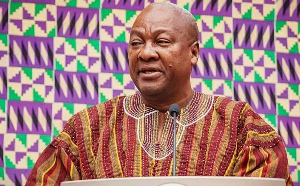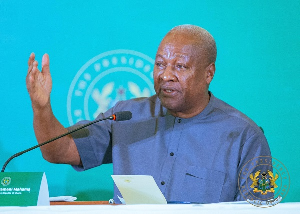A modern concession in Ghana
“Africa’s natural resource wealth rights belongs to the continent’s citizens, but these citizens are being robbed of its benefits by revenue diversion, corruption, jobless growth and rising inequality,” Kofi Annan. Geneva, September 26th 2013.
Dr. Peter Eigen observed that The World Bank and Western Governments do not see anything wrong with the multinational companies engaged in extractive industries paying tens of millions of dollars into private accounts overseas to secure bad contracts and agreement in their favour. DW TV Journal interview, 31st December, 2013.
These are sobering observations to guide us in our quest for a “Better Oil Deal for the mass of Ghanaians,” not only a few connection men linked to the powers-that-be.
At long last, the much awaited Petroleum (Exploration and Production) Bill, which was withdrawn from Parliament in 2010 under protest from some of us, has finally arrived in a new form. Though I have some misgivings about the Bill in general, especially the numerous powers given to the Minister of Energy, my main concern are about the fiscal provisions it contain and what kind of fiscal regime or arrangement we are adopting to maximize the full potential of our natural oil and gas resources. The Bill has been cunningly designed to look like a “contract for work law” which governs production sharing agreement but it is not.
The Bill is essentially in all respect the Royalty Tax system which include some aspects of Joint Ventures and Production Sharing Agreement (PSA) in implementation to conform and fall in line with the current prevailing system which GNPC and the Ministry of Energy referred to as a Hybrid system. It is referred to as “Modern concession” because, unlike the old traditional concession under which only Royalties and Taxes are paid to the host government, this hybrid allows Ghana some participation interest, which makes the Bill look like a Joint Venture, or some loose form of partnership for which Ghana has to pay for capital cost development which is normal under both Joint Ventures and Production Sharing Agreements.
Normally, under Joint Ventures and Production Sharing Agreements, allocations are made from production to take care of daily operating and technical costs. Under this hybrid system which the World Bank and Oxfam America are forcing down the throat of Ghana through their Ghanaian well-resourced and financed surrogates, who are always on radio and TV, Ghana is being made to contribute also towards daily operating cost which I consider abnormal. Ghana, therefore, within the next 10 years would have to hand over US$ 1.8 billion to the Jubilee partners for participating in the project (Energizing Economic Growth in Ghana 2013). Since there is no provision in PNDC Law 84 to back this sort of bizarre arrangement which defies all international practice, the Draft Bill makes provision to capture this abnormality, see Section 10(b) (ii) of the Draft Bill.
The financial obligations that this clause would place on Ghana are so huge that the burden on the limited resources available to meet our infrastructural deficits cannot be underestimated if we have to adopt this hybrid system in the Draft Bill. The implication also is, as a Nation, we cannot increase our take from our own resources which belongs to us under the Constitution without having to pay heavily for it. This would create inequalities in sharing the oil revenue. This is the main disadvantage of operation under Joint Ventures.
This hybrid system also makes provision for minimal carried interest under which a small percentage of production is given for free as owners of the resource, something which does not exist in the old traditional concession. This carried interest ranges from 3% to 10% in the old contracts signed, but raised to 15% in the Draft Bill. The carried interest provisions are not found in PSA laws; what is found is how the profit oil is shared.
This hybrid system, referred to as the Modern Concession, was designed by the British and the Americans as an antidote to the Production Sharing Agreement which was started from the East – Indonesia precisely. It would be recalled the British and the American oil giants operating in that country protested vehemently against the PSA when it was introduced, arguing ineffectively that they took all the risks.
This Modern Concession is what the World Bank, IMF, Oxfam America and Revenue Watch are imposing on newly emerging oil producing countries in which their political leaderships and the elite technocrats are not smart and savvy enough and cannot read between the lines since they had no clue about these things to shape their consciousness. Perhaps, some might be smart and aware but decide to turn a blind eye for whatever expected benefits, real or imaginary, the boon might bring them as the gatekeepers and the men about town who become connection men and surrogates for these FOCs. One contract can make you a multi-millionaire, we all know; so it is much better to be on the side of the people with the money bags.
This Modern Concession is as equally exploitative as the old traditional concession. For example, Ghana should be earning close to US$5 billion in total at the end of 2013 under the PSA; God bless us if we did earn US$2 billion under the current prevailing system – Modern Concession. Ghana is losing almost US$3 billion within 3 years of operating the Jubilee Fields under this Modern Concession. See tables below:
Table 1.
PROJECTED POSITION 3 YEARS OF OPERATION ENDING 2013, UNDER ROYALTY TAX SYSTEM
Barrels US$ %
Total Output 96,077,000, 10,262,573,617
Ghana 17,361,223 1,840,197,044 17%
FOCs * 78,715,777 8,422,376,573 83%
Note: The total investment of US$4 billion would have been fully recovered at the end of 2013
Table 2.
PROJECTED POSITION UNDER PRODUCTION SHARING AGREEMENT 3 YEARS ENDING 2013
Barrels US$
Total Output 96,077,000 10,262,573,617
Royalty 5% 4,803,850 513,128,680
Production Cost 10,950,000 1,180,737,040
Capital Cost Recovery 11,497,500 1,239,773,892
Total Direct Cost 27,251,350 2,933,639,612
Profit Oil 68,825,650 7,328,934,005
Ghana 60% 41,295,390 4,397,360,403
FOCs 40% 27,530,260 2,931,573,602
Total 68,825,650 7,328,934,005
Table 3.
PROJECTED TOTAL DUE GHANA UNDER PRODUCTION SHARING AGREEMENT 3 YEARS ENDING 2013
Barrels US$ %
Royalty 4,803,850 513,128,680
Profit Oil 41,295,390 4,397,360,403
Total 46,099,240 4,910,489,083 47.98%
Table 4.
PROJECTED LOSSES TO BE SUFFERED BY GHANA, 3 YEARS ENDING 2013
Barrels US$
PSA 46,099,240 4,910,489,083
RTS 17,361,223 1,840,197,044
Losses 28,738,017 3,070,292,039
Table 5.
PROJECTED TOTAL DUE FOREIGN OIL COMPANIES 3 YEARS ENDING 2013
Barrels US$ %
Production Cost 10,950,000 1,180,737,040
Capital Cost Recovery 11,497,500 1,239,773,892
Profit Oil 27,530,260 2,931,573,602
Total 49,977,760 5,352,084,534 52.02%
If Ghana was operating under the PSA, Ghana would be earning as much as over US$50 billion in 20 years as against the US$20 billion and the US$19 billion estimated by IMF and the World Bank respectively.
Note: The conservative estimated value of the Jubilee Fields which is estimated to hold about 2 billion barrels of oil is US$160billion, excluding the value of the associated gas.
Since 2009, I have been telling Ghanaians that there is no economic and moral justification to engage a contractor who spent about US$4 billion, as they claimed, to work on our oil valued over US$160 billion, and before production begun the World Bank and the IMF rushed to announce to us that, us owners of the oil, we would be receiving about US$20 billion and we are happy and excited and have stopped thinking. They are taking the bulk of the revenue because they said they brought their money to invest. Yes, they brought in some money, but there is an alternative which can insure us a fair share of our wealth and good returns to them too; an alternative which countries far lesser in stature than Nkrumah’s Ghana are adopting.
This is the message I have carried to the political class including Parliament, the elite technocrats, Institute of Economic Affairs, Centre for Economic Policy Analysis, KASA, Imani Ghana, GNPC, Ministry of Energy, Isodec, Ghana Institute of Journalism, the Academia of our tertiary institutions, Africa Centre for Energy Policy, PAIC, Civil Society Organization Platform on Oil and Gas, Chiefs, The Christian Council and prominent individuals in high places but they all failed to understand me because in their mind, in the truest of colonial mentality and subservience, the white man has come to help us to get our oil out of the ground and we must be grateful for whatever we get, as the oil would have remained in the ground! Really?! Some people even accused me of being influenced by Mr. Kofi Wayo, as if that is a horrible disease I have caught.
If the Bill is passed in its current form, it would enable the foreign oil companies to make between 500% to 600% net returns on capital investments thereby denying us a fair share of our wealth. Indeed, Ghana is being robbed of its oil wealth the same way as gold and other minerals which have been mined in Ghana for over a century with no sign of advanced development in the mining areas and the country comparable to mining areas in the Western world. It is surprising Ghana is about to pass a law to legalize and perpetuate the robbery of her citizens Kofi Annan complained about. If the Bill is passed into law, it would amount to an economic suicide committed by the leaders of Ghana, plunging the current generations and the future ones into eternal economic bondage which can only be described as modern day slavery. Neo-colonialism is now too soft a word to describe the ongoing plunder of many African countries.
I am by this publication appealing to Dr. Kofi Annan for and on behalf of the People of Ghana to come down to talk to the President and his Cabinet to invite independent international experts to have a second look at the fiscal provisions in the Bill and other aspects of it. I equally appeal to Dr. Peter Eigen to assist Dr. Kofi Annan in this regard. I am aware he was responsible for drawing the formidable fiscal regimes for Botswana and Namibia governing their extractive industries, making them among the best on the continent.
By Solomon Kwawukume
solomon.kwawukume@yahoo.com
Author – Ghana’s Oil and Gas Discoveries: Towards Full Maximum Benefits
Opinions of Monday, 10 February 2014
Columnist: Kwawukume, Andy C. Y.














